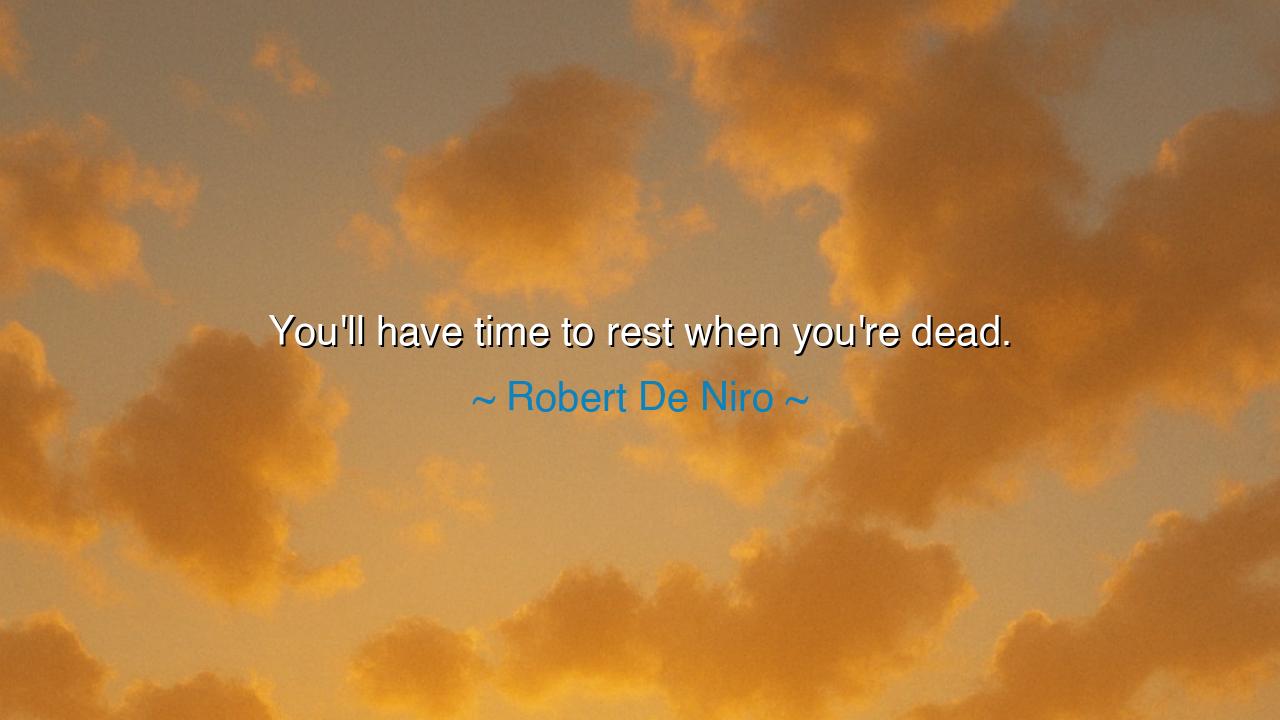
You'll have time to rest when you're dead.






“You’ll have time to rest when you’re dead.” — Robert De Niro
In this sharp and unyielding declaration, Robert De Niro, the acclaimed actor known for his relentless craft and discipline, captures a truth as old as the human struggle itself — that life is not for idleness, but for labor, purpose, and creation. When he says, “You’ll have time to rest when you’re dead,” he is not glorifying exhaustion or blind ambition. Rather, he is invoking the ancient creed of those who understand that existence is fleeting, and that our brief time beneath the sun must be used to its fullest. The saying burns with a kind of sacred urgency — a reminder that the grave is still, but the living must move.
Though spoken by a modern man, these words are rooted in an eternal wisdom that echoes through the ages. The Stoics of Greece and Rome, men such as Seneca and Marcus Aurelius, taught that time is our most precious possession — that it slips through our fingers like water, never to return. To waste it in idleness or complaint is to betray life itself. De Niro’s words are the actor’s version of the Stoic call: do not rest while your work remains undone. For in the silence of death, there will be rest enough; but in the heartbeat of life, there is the call to effort, to creation, to striving.
This philosophy has been lived out by countless souls across history who gave their lives to the pursuit of something greater than comfort. Consider Leonardo da Vinci, who wrote in his notebooks, “As a well-spent day brings happy sleep, so a life well used brings happy death.” He rested little, for his mind was aflame with ideas — painting, engineering, science, anatomy, invention. To him, fatigue was not an enemy but a sign of life’s engagement. In every sleepless night of study, he obeyed the same principle De Niro would echo centuries later: that the soul finds rest not in ease, but in the fulfillment of its purpose.
And yet, beneath De Niro’s bluntness lies compassion — a recognition of the briefness of our mortal span. He is not telling us to work mindlessly, but to live fully. The ancient Hebrews wrote in their Psalms, “Man’s days are as grass: as a flower of the field, so he flourishes.” We bloom for a moment, and then we are gone. Knowing this, De Niro’s challenge becomes clear: while you draw breath, give everything you have to the life you have been given. Create, love, strive, and do not wait for permission to begin. For rest — true rest — belongs to eternity.
This creed can be seen in De Niro’s own life. Known for his dedication to craft, he immersed himself so deeply into his roles that he transformed entirely, living each part until it consumed him. He trained for months to become a boxer in Raging Bull, learned Sicilian for The Godfather Part II, and worked tirelessly behind the camera as a director and mentor to others. His quote was not mere bravado; it was the rule by which he lived. He understood what the ancients called areté — excellence — the full realization of one’s potential through effort. The world owes its art, its progress, and its greatness to such spirits who choose action over comfort.
Yet, the saying also carries a warning. Many crave rest not from laziness, but from despair — from the weight of life’s burdens. To them, this quote does not call for endless toil, but for enduring purpose. It reminds us that meaning itself is the cure for weariness. When a man works toward something he loves — a craft, a dream, a cause — even his exhaustion becomes sacred. But when he drifts without purpose, every hour becomes heavy. Therefore, the true teaching here is not “work without rest,” but “live without regret.” Fill your days so fully with purpose that even death, when it comes, finds you still creating.
Lesson:
From Robert De Niro’s words, we learn that life is motion, and rest is the privilege of the grave. Do not waste the hours that have been lent to you. Rise each day as if summoned by destiny, for in truth you are — summoned to build, to love, to contribute your verse to the song of the world. Do not fear weariness; fear only emptiness. Let your labor be your offering, your effort your prayer. Rest will come, as it comes to all — but until that hour, live so fiercely and so fully that when death at last extends its hand, you may smile and say, “Now, at last, I have earned my rest.”






AAdministratorAdministrator
Welcome, honored guests. Please leave a comment, we will respond soon